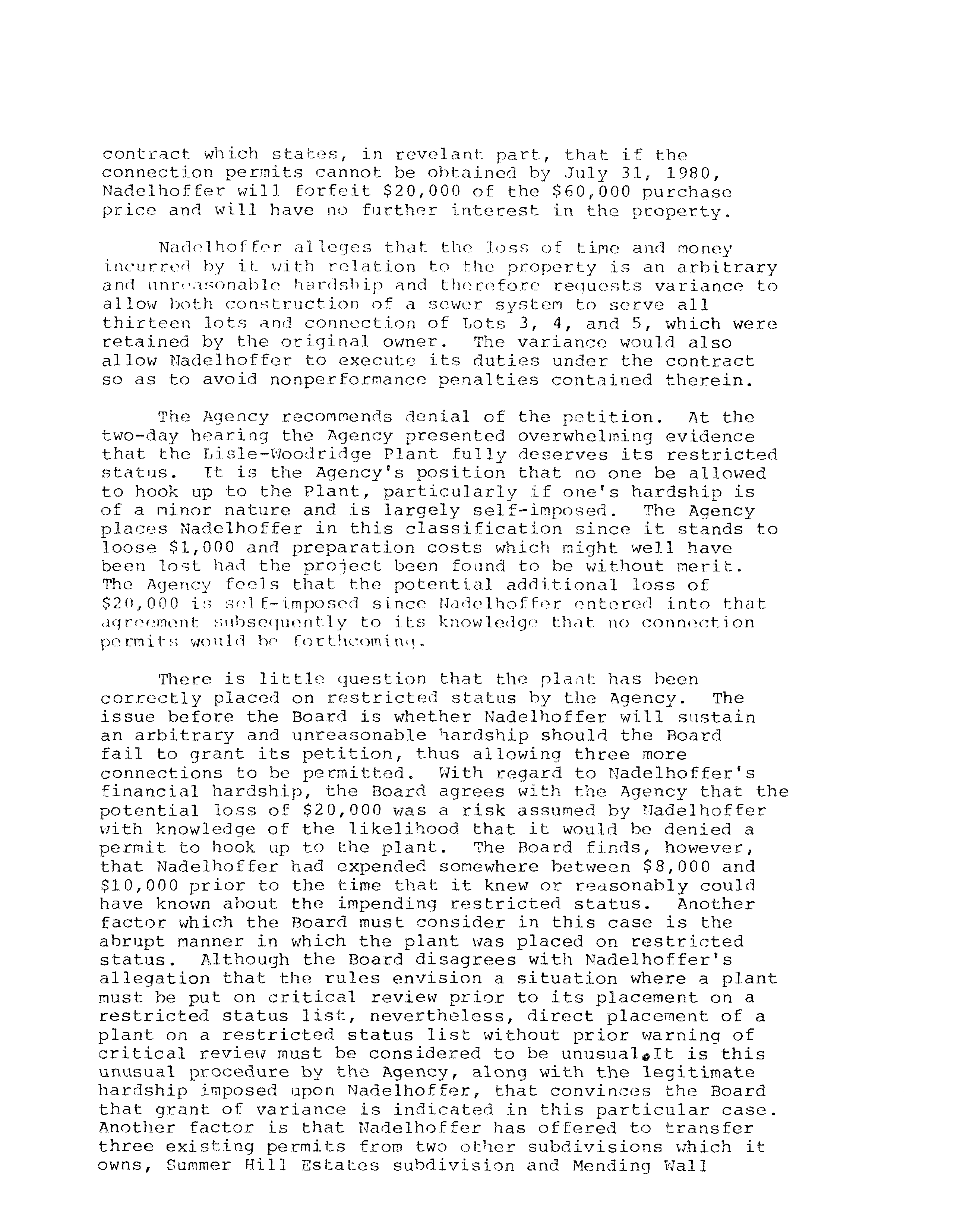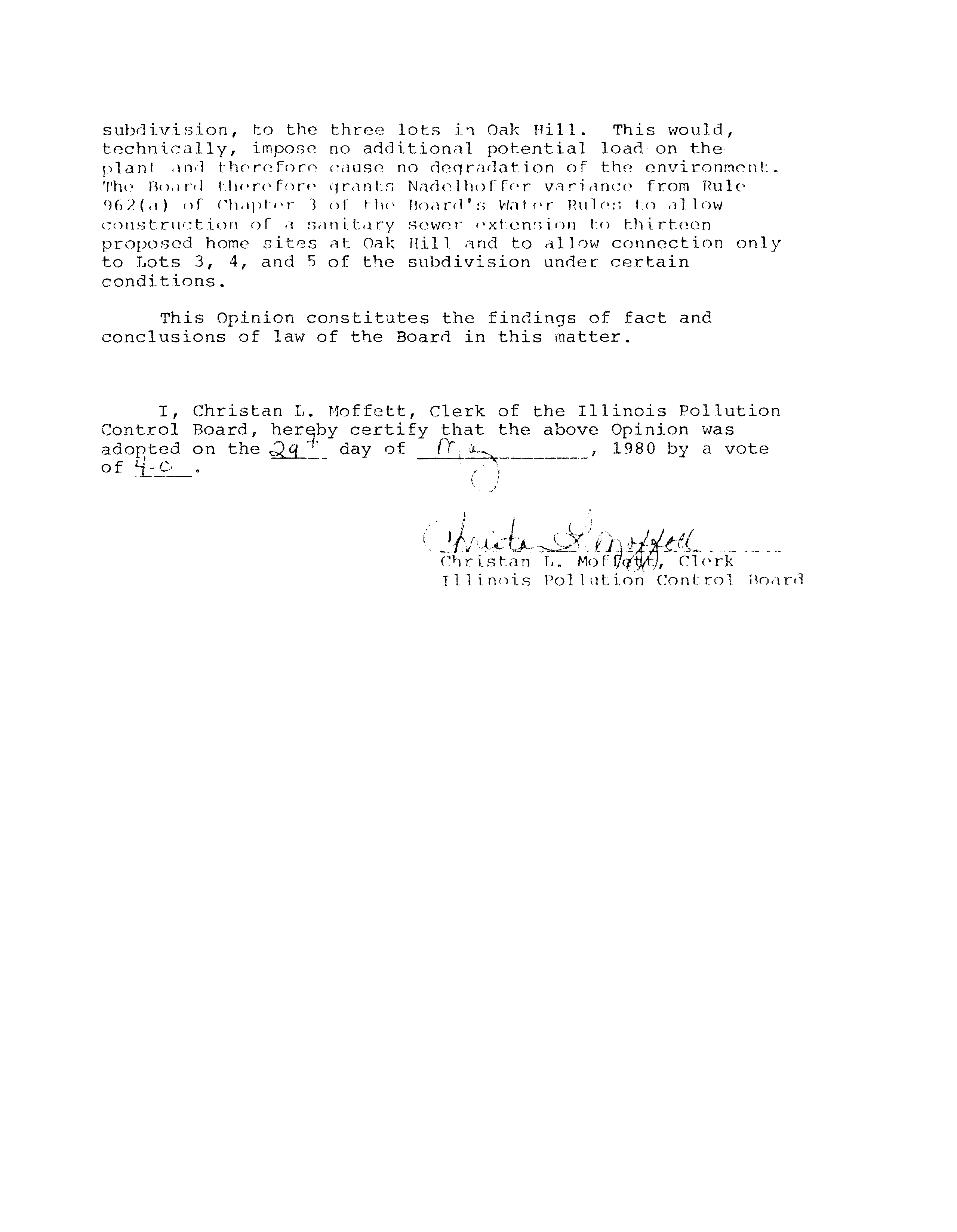ILI LNDIS
POLLU TI ON
CONTROL
POAPD
Ma
28,
1980
Nil
LJlOFTE1?—~ifLflOH
AND
ASEOCIATHS
(/\K
F!
I hi
l~~ATF~~
)
,
)
Pet:
iJjoner,
V.
)
NCR 80—9
ILLINOIS
ENVIRONMENTAL
PROTECTION
AGENCY,
Respondent.
PAUL
M.
MITCHELL
APPEARED
ON
BEHALF
OF
PETITIONER.
JUDITH
GOODIE,
ASSISTANT
ATTORNEY
GENERAL,
APPEARED
ON
BEHALF
OF
RESPONDENT.
OPINION
OF
THE
BOARD
(by
I.
Goodman):
Thi~
Dpi
n
ion
i
in
~u)port
of
the
Hoard
Order herein
ci
M
i
y
1
r~
,
1
88
(1
NcId(1
h(Thr
for—Wi i:;on
and 7\s~oe at:e~: (Nadeiholfer
)
filed
a
petition for
variance
from Rule
962(a)
of Chapter
3:
Water
Pollution Control Rules and Reaulations
(Water Rules)
on
February
8,
1980,
Hearings were held in this matter on
April
9 and 10,
1980.
The Roard has received no public comments
in this matter.
In August of 1978 Nadeihoffer entered into
a contract to
acquire certain
real estate known as Oak Hill
Estates
(Oak Hill)
which
is
the
subject of this proceeding.
Nadelhoffer was
to
subdivide the subject property into thirteen
lots and
fully
improve the lots with sewer, water and roads.
Three of these
lots,
including one containing
a residence,
were to he retained
by the original owners.
The contract called for Nadelhoffer to
pay $1,000 should the contract not be
fully executed.
After
incurring expenses totaling somewhere between $8,000 and $10,000,
Nadeihoffer,
along with the Village of Woodridge,
on June
20,
1979 filed with the Illinois Environmental Protection Agency
(Agency) connection permit applications, at which time
it was
informed that the Lisle—Woodridge
sanitary treatment plant
had been placed on restricted status by the Agency.
Subsequent
to the time
of notification of the unavailability of the
connection permits,
Nadelhoffer entered into an amended
contract: which
states,
in
revelant:
part,
that
if the
connection permits cannot
be ohl:ained by
July
31,
1980,
Nadeihoffer will
Forfeit $20,000
of the $60,000 purchase
price and will have
no further
interest
in the property.
NadeTho I For al
leqeS
that
the
~1
oss
of
t:uie and
money
incurred by
it:.
with
relation to the property
is an arbitrary
and
unr~~isonablc’
hardship
and
therefore
requests
va
riance
to
allow
both
construction of a sewer
system
to serve
all
thirteen
lots
and
connection
of
Lots
3,
4,
and
5,
which
were
retained
by
the
original
owner.
The
variance
would
also
allow Naclelhoffer to
execute
its duties under the contract
so as to avoid nonperforrnance penalties contained therein.
The Agency recommends denial of the petition.
At the
two—day hearing
the Agency presented overwhelming evidence
that the Li.sie—Woodridge Plant fully deserves its restricted
status.
It
is the Agencyvs position
that
no one be allowed
to hook up to the Plant, particularly
if one~shardship is
of a ninor nature and is
largely self—imposed.
The Agency
places Nadelhoffer in this classification since
it stands to
loose $1,000 and preparation costs which might well have
been
lost had the project been found to
he without merit,
The
Agency
foe~s that.
the potential
additional
loss
of
$20, 000
is
s(~lF—imposed since Nadelhof or
entered
into that
uq re~’ment: subsequently
to
Ls know ledge
t:hat
nO
connecti on
pe rmit~~ would ho
lett~hcomino.
There
is
little
question
that
the
plaut
has
been
correctly
placed
on
restricted
status
by
the
Agency.
The
issue
before
the
Board
is
whether
Nadelhoffer
will
sustain
an arbitrary and unreasonable hardship should the Board
fail
to grant
its petition, thus allowing three more
connections
to he permitted.
With regard to Nadelhoffer’s
financial hardship,
the Board agrees with
the Agency that the
potential
loss
o.F $20,000 was
a risk assumed by Nadelhoffer
with knowledge of the likelihood that
it would be denied
a
permit
to hook up to the plant.
The Board
finds,
however,
that Nadelhoffer had expended somewhere between $8,000 and
$10,000 prior to the time that
it knew or reasonably could
have known about the impending restricted status.
Another
factor which the Board must consider
in this case
is
the
abrupt manner
in which the plant was placed on restricted
status.
Although the Board disagrees with Nadelhoffer~s
allegation that the rules envision
a situation where
a plant
must he put on critical review prior to its placement on a
restricted status list,
nevertheless, direct placement of
a
plant on a restricted status list without prior warning of
critical review must be considered
to be unusual~It is this
unusual procedure by the Agency,
along with the legitimate
hardship imposed upon Nadeihoffer,
that convinces the Board
that grant of variance
is indicated~~inthis particular case.
Another
factor
is
that Nadelhoffer has
offered
to
transfer
three
existing
permits
from
two
other
subdivisions
which
it
owns,
Summer
Hill
Estates
subdivision
and
Mending
Wall
subdivision,
to the three
lots
i~i
Oak
Hill.
This
would,
technically,
impose no additional
potential
load on the
plant
a
ni
there
icre
eause
no deqralat. ion of the environment:
The
l301r41
~hero
fore
qrantn
Nadeiholier
variance
frm
Rule
96
2
(
d
)
)
I
(‘Ii
~pt~’ r
of
the
1~oa
rd
‘
~
Wa
t
or
Ru 1
(O~
to
a
1
OW
constrtint:iori
ci
a
sanitary
sewer
‘‘xtcn5j~)n
t:e
thirteen
proposed
home
sites
at
flak
Hill
and
to
allow
connection
only
to
Lots
3,
4,
and
5
of
the
subdivision
under
certain
conditions.
This
Opinion
constitutes
the
findings
of
fact
and
conclusions of law of the Board
in this matter.
I, Christan L.
Moffett, Clerk of the Illinois Pollution
Control Board, her~hycertify that the above Opinion was
adopted on the ~
day of
~
1980 by
a vote
of
~
Christan
L,
MoFd~i~J, Clerk
1 11 i nois Pol
I ut,ion Con1:roT Hoard



